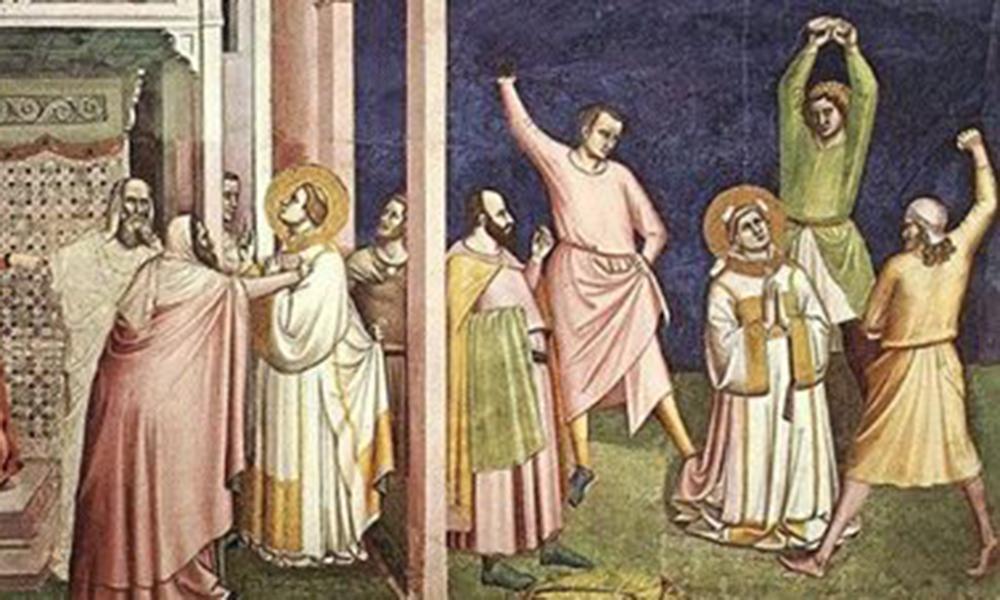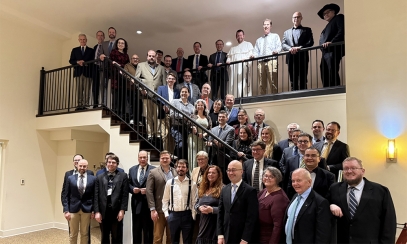
‘Is It Possible to Live the Way Christ Proposes?’
Bishop Raica Celebrates the 7th Sunday in Ordinary Time
Bishop Raica Celebrates the 7th Sunday in Ordinary Time
On Feb. 20, Bishop Raica celebrated Mass at the Cathedral of St. Paul, marking the 7th Sunday in Ordinary Time. The complete text of his homily follows herein.
On Feb. 20, Bishop Raica celebrated Mass at the Cathedral of St. Paul, marking the 7th Sunday in Ordinary Time. The complete text of his homily follows herein.
My friends, in this week’s Gospel, we are given some real challenging words beginning with the Gospel acclamation, “I give you a new commandment, says the Lord: love one another as I have loved you.” Perhaps different lines from the Gospel will strike each of you differently. Maybe you were struck by, “Do to others as you would have them do to you,” the so-called “Golden Rule,” which seems to be a good source of examination of conscience for any one of us. Or, perhaps it was, “Be merciful, just as your [heavenly] Father is merciful.” Or maybe it was one of the more challenging lines like, “Love your enemies – do good to those who hate you.” Our Lord says it, and we have to wrestle with a lot of different things He says. It doesn’t always conform to our (my) way of life or our (my) comfort zone.
The main issue here is that the Lord is trying to expand the horizon of how the disciples think and live. He was looking at not only where they were, but also looking in their hearts for their desire, their urge for something, an insight, only He as Lord could give. In other words, to be a Christian, we can’t and don’t think like others. We don’t live like everyone else. We must think and live differently, always reflecting not our limitations, but the infinite reality of God who tells us, “Look at your world the way I look at it.” Honestly, friends, that is going to take a lifetime. The message of God is oftentimes summed up by “love” and “mercy.” These are two distinct lungs which characterize the very nature of God to which we aspire and to which we are configured as Christians.
That God “loves” remains one of the very amazing mysterious truths of our faith. From our perspective, love can be elusive, wrapped up in emotion and shaped by trust and mistrust, but love, it seems in the subtext here, is grounded not only in human but divine terms. It is grounded in God’s desire for the destiny and good of the other. That’s why we were created – to know Him, love Him, serve Him in this life so that we can be with Him in the next. He wants us to be with Him, not on our terms but on His. To love means something more. In our world today, that can be a real challenge, especially if we are using limiting categories and characterizations of people by color, ethnicity, language, creed, age, or other factors that seek to reduce them in our own eyes. Through this passage today, we are reminded to abandon limiting characteristics and love the way God loves. He tells us about it, and then He demonstrates His love for us through His own suffering, death, and resurrection.
The second is “mercy.” Now, we all expect that we will experience in some capacity the very mercy of God. We do so whenever we go to confession. God is merciful – full of mercy, we believe. We are the recipients of His mercy and forgiveness, something that tells us not to look back but instead to arise and move forward as a disciple. He invites us to do the same. Mercy doesn’t mean we can do whatever we like. More precisely, it is to see with the heart – to see as God sees – thereby not living merely from an earthly perspective but allowing the power of God to mix with ours. After all, in baptism we have put on Christ.
Amid all the commands that the Lord challenges His disciples (and us!) with – “Love your enemies, do good to those who hate you, do to others as you would have them do to you, stop condemning, forgive and so forth – we come in with our exceptions because of past wounds and hurts and because we aren’t ready yet to let go. Curiously, the passage is also punctuated with another antiphon like response, “Even sinners love those who love them.” “Even sinners do the same.” “Even sinners lend to sinners.” So, what would make the thoughts and actions of the Christian, of a disciple, so very different? Are we doing what everyone else is doing, or is the life of a Christian different? If so, how?
In other words, is it possible to live the way Christ proposes? Is it possible to live as a Christian today? When you think about it, the early communities had probably heard very little about Jesus, especially when you think there was no social media or the modern means of communication that we depend upon today. The government of the occupying Romans was no help in the beginning, but they had to find a way to do something different. Even David does something different when he could have overtaken Saul as he was urged to but didn’t.
In a similar way, St. Paul tells the Corinthian community,
“Just as we have borne the image of the earthly one, we shall also bear the image of the heavenly one.” Human and divine. Born of an earthly mother and born again of water and the Spirit through the font of baptism, our heavenly mother who brings us into the light.
There is a letter to a person named Diognetus who lived in the 2nd century from an unknown author that illustrates some of the unique differences I’ve been referring to here. Here is a selection of statements from that letter:
“Christians are indistinguishable from other men either by nationality, language, or customs. They do not inhabit separate cities of their own, or speak a strange dialect, or follow some outlandish way of life. ... With regard to dress, food, and manner of life in general, they follow the customs of whatever city they happen to be living in ...
“And yet there is something extraordinary about their lives. They live in their own countries as though they were only passing through. They play their full role as citizens, but labor under all the disabilities of aliens. Any country can be their homeland, but for them their homeland, wherever it may be, is a foreign country. …
“They pass their days upon earth, but they are citizens of Heaven. Obedient to the laws, they yet live on a level that transcends the law. Christians love all men, but all men persecute them. Condemned because they are not understood, they are put to death but raised to life again. They live in poverty but enrich many; they are totally destitute but possess an abundance of everything. … They are defamed but vindicated. … They are attacked …]as aliens, they are persecuted … yet no one can explain the reason for this hatred. …
“Similarly, the world hates the Christians, not because they have done it any wrong, but because they are opposed to its enjoyments.
“Christians love those who hate them … so Christians flourish under persecution. ...”
So, as disciples of Jesus, we are imbued with love and mercy – to be developed not from our point of view but from God’s. We don’t always get it right. We continue the journey together always to go deeper into the very mystery of our life as sons and daughters of a benevolent, loving God. Is it possible to live this way for a Christian? I believe it is. Over the years, we have had so many witnesses who affirm that yes, it’s possible. It can be done. Our roster of saints is filled with many individuals across every spectrum of life whose lives answered the unique call to become a living icon of God’s love and mercy in our world today, and so can we! May God bless you all!



